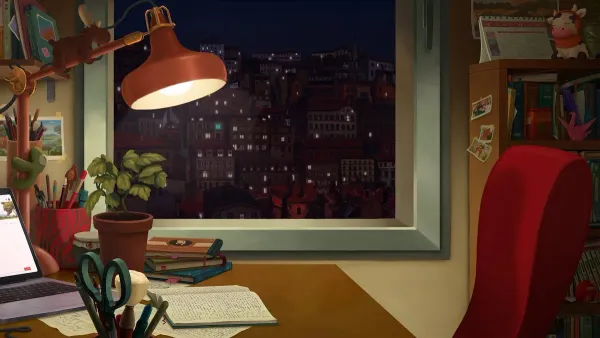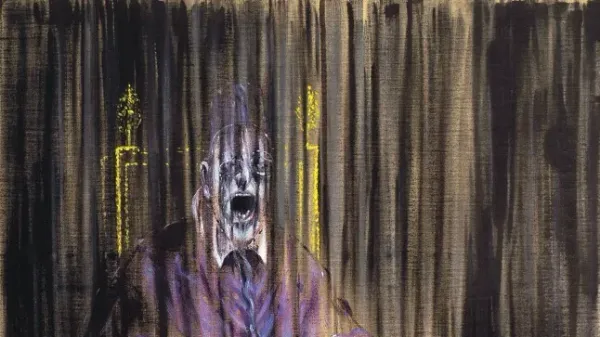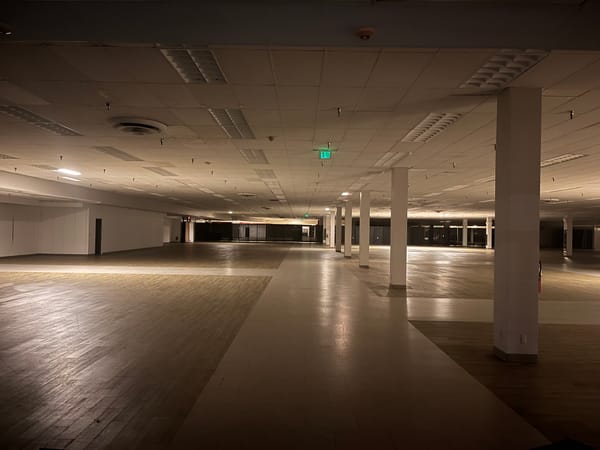The Sisterhood of Perpetual Apology
I apologize too much.
My first memory of making an apology was in elementary school. I must’ve been in second or third grade- young enough to understand, at some fundamental level, that something was catastrophically different about me, but not old enough to understand what it was, or that it wouldn’t get better as I got older. I can’t actually recall what the apology was for. Most likely, it was some form of misbehavior, some lashing out against a world that I thought wanted to hurt me but in reality only didn’t understand me.
I remember this apology particularly because I didn’t know how to do it- I remember trying to put some jokes in the card I wrote, because I was a ‘funny’ kid back then, and writing that kind of stuff was the only sort of social value I understood myself to have. I don’t even particularly recall what I was apologizing for, only the confusion I received when I turned it in, because didn’t this kid understand what an apology was? That it wasn’t supposed to be funny? Looking back, this incident seems like the first time I understood the slippage between myself and others: the things that they performed that I could not understand.
When I was younger I would argue with my parents all the time. They loved me as best I could, but looking back I think they saw my frequent disturbances (crawling under the desk to read a book, running out of the classroom in an overstimulated panic, hiding in the bathroom and weeping because no one liked me and I didn’t know why) as some kind of willful defiance, rather than the incongruity between the way my brain actually worked and the social reality in which I was expected to live.
I remember knock-down, drag-out arguments with my parents: about my grades, about my performance in school, about my mental health. When I was younger I was a ‘good’ debater in the Debate Club sense- adept at finding logical flaws in arguments, trying to unravel them. My mother would often accuse me of setting ‘verbal traps’ for her, trying to lead her into blunders where I could score cheap hits. It was the only time during our frequent arguments I ever really felt any sense of control, or agency, because I simply did not have the language to make myself legible to her or anyone else. This, of course, only upset her more, provoked more fear: I had moved from the class of a misbehaving child to a resistant one.
The thing about family arguments, of course, is that you never really win them. I could defend myself as best as I was able, muster all the arguments, attack and dismantle every point raised against me, and yet in the end both of us would be left to stew in a mire of angry silence, a miasma of mutual distrust and fear that confined us to our separate rooms in the house for hours or days.
I can’t exactly remember when I started just apologizing. Most probably it was early high school, when the anxiety about my identity and body that had been simmering my whole life suddenly boiled over into something nightmarish that threatened to violently dismantle everything around me. I was never a sociable kid- I had typical ‘lost puppy syndrome’, clinging to whoever would show me affection or validation- but from what I recall of those years I turned even further inwards. I spent most of my time in online spaces, ones I could be a girl in, or at least pretend to be.
If realizing I was trans was eventually liberatory for me, than it was also immediately painful. The fog of dysphoria and dissociation that had hung to my body for as long as I could remember suddenly coalesced, crystalized into something concrete. I began to loathe my body, my face, my voice; even the ways that I acted in unguarded moments, the loudness and brashness I had learned to perform in order to be a ‘real’ boy. I felt that it was not just that I had an unfixably masculine body, I had an unfixably masculine mind, too. I had been vaguely aware that something was wrong with me for my entire life: only now was I certain what it was.
Apology, then, as a natural response. What was wrong seemed intractable, and I could not forgive myself for it, not while the dull weight of dysphoria sat on my chest every hour of every day. I began to understand that I was garbage, that I was a freak, that I was not even human. I could not stay within the trans spaces open to me, because they could not seem to understand what it was to hate yourself the way I did, to see being trans as a kind of death sentence imposed upon the already living. When you have given up any pretense of ego-defense, apology becomes easy.
‘I’m sorry’ quickly became my go-to response. I held it up like a shield. I wanted to tell the world: yes, I know I am wrong, yes, I know I am a freak, I am sorry, I am sorry. I want to stop but I can’t. I learned when a preemptive apology would head off an argument. I began to yield reflexively, rolling over to expose its belly.
I saw videos of trans women yelling in moments of desperation, their very volume and aggression used to justify how of course they weren’t women, because what woman yells like that? I decided I would never be like they were. I was, after all, ‘one of the good ones.’
It didn’t work. Of course it didn’t work. If you’re trans and reading this you know it doesn’t work, because you’ve been there, or seen others try and fail. In forums where the average user was as self-loathing as I was, I tried to be utterly kind and yielding. I would accept anything anyone said about me, try to see things from the point of view of even the cruelest. It wasn’t kindness, of course, even though I was trying. It was a performance of compassion, stripped of everything but weakness. People noticed, of course. They saw a soft target and went for it, because wherever there is an exposed belly there is also a knife. If you bring up my handle in these spaces there will still be people calling me a TERF.
In my real life, too, it failed. Arguments continued, only now I was constantly yielding ground, acceding to every criticism thrown my way. If I had intended apologies to end arguments, instead they provoked them, like how a fencer might see a backstep from their opponent and respond with an advance. I recall being told over and over what I was doing wrong, the arguments stretching into the hours, until I was nothing more than a gibbering mess repeating my dumb mantras: I’m sorry, I’m sorry, please stop hurting me, I’m so sorry.
I am trying to apologize less.
When you are a trans person (and when you are a trans woman specifically), it occasionally feels that the one thing every side of the political spectrum agrees on is that there is something you must be penitent for. For the right, this penitence is impossible, ending only on our deaths and perhaps not even then. For the left, it’s more tricky.
There is a concept called ‘male socialization’, a gender-theory buzzphrase that most likely began with good intentions but now more often than not seems primarily deployed as a rhetorical weapon against trans people. The concept says that trans women were ‘trained’ to be male, and (less often explicitly stated) that they unconsciously bring their ‘male’ behaviors and ‘male’ power dynamics into interpersonal relationships. I can’t really say how much water this theory holds. Certainly, I was raised differently than I likely would’ve been if I had been assigned female at birth. I am less certain that I received some perfect, complete ‘man training’, which still informs my actions, doubly so considering so much of my life consisted of my own failure to meet the standards of masculinity. (I still reflexively flinch whenever I hear ‘man up.’)
What it seems to amount to in practice, however, is a kind of original sin for trannies. We are born defective (male socialized), and we must constantly engage in penitence, recognize ourselves for the sinners we are, give thanks to those (afab and other marginalized folx) who have granted us the ability to be freed from our sin. ‘Male socialization’ served as a kind of gloss to justify the intense sense of isolation I felt within ‘queer’ communities, the constant sense that I was failing some test I was unaware I was taking. It was another part of the box of ‘essential maleness’ that I felt I could not ever escape, as unchangeable as my DNA.
I am not going to pretend that transition has only been isolation and pain. In many ways, coming out as trans has been the most liberatory experience of my entire life. My life before then seems hollow and empty, devoid of color. I am witness to new feelings, new modes of being, new ways of relating to and loving those around me. Even now, as lawmakers across the country increasingly call for harsher and more punitive sanctions against trans people for the crime of existing, I do not regret coming out.
I want to emphasize that I was not ‘safe’ living as a cis boy. There is no safety in living in a body that is growing more alien to you by the day, no safety in being unable to recognize the person staring back at you in the mirror. Being closeted and trans is a slow death- if not a death of the body, than the death of the soul, becoming increasingly severed from any connection from the outside world. Sometimes I still have episodes of derealization, where the world itself seems fuzzy, where my own body and identity seem paper-thin and easily done away with. I can only imagine how worse it might’ve been if I had spent five or ten more years in a body that was ambiently hostile to my own existence.
As trans women, it can feel like we serve a ‘dual purpose’ within progressive politics. On one hand, especially now, it is good for an organization to be seen to have us around. We are desirable amongst certain groups of people as a symbol. Our membership in a group (albeit not in leadership positions) is viewed as a signal of virtue: the trans woman as a kind of virtue totem.
However, this is a double-edged sword. Our perceived proximity to maleness, to the transmisogynistic archetype of the transvestite-rapist, makes us disposable in these same circles in a way that others are not. I believe most cis people (as well as many other trans people) believe at some fundamental level that we are ‘faking it’, that at some point we will take off the breast forms and go live ‘normal’, male lives. Allies cheerfully voice sentiments like ‘all gender is drag’, equating our gender to a facsimile, something performed. If all gender is drag, then removing the makeup and breast forms (most allies do not consider hormones) and you are left with a cis man.
We become, then, a kind of scapegoat or voodoo doll. When those in an activist group say ‘white men have an unaddressed racism problem’- well, it’s difficult to disagree, but these groups have no lever by which to affect change in white men. So, instead, the statement might become ‘white trans women have an unaddressed racism problem’, and we might be made to stand on behalf of men, being socially vulnerable enough to buckle under pressure.
It’s not an exaggeration to say transmisogyny is omnipresent in trans women’s interactions with society at large. This is not, of course, to imply that everyone who Isn’t Us is a frothing-at-the-mouth transphobe, hungry for estrogenized blood.
More accurately it’s to say that transmisogyny has been the only narrative about our existence for centuries. It is the water through which we swim. The predatory transvestite, the deceitful transvestite, the sadistic or callous transvestite: these are storytelling archetypes. Like all archetypes they exist as a narrative shorthand, a way to create narratives in a more convenient way. Most queer/trans people do not go through the deliberate effort to deprogram themselves. Hell, most trans women don’t.
So as trans women we become acutely aware of the conditionality of our acceptance. When we are loud, when we are aggressive, when we are advocates for ourselves in ways that go against the dominant group narrative, we are perpetually at risk of crossing the boundary between ‘marginalized individual’ and ‘entitled (male) breaker.’
We are often accused of being insular and clannish, especially online: this insularity is a form of self-defense. Congregating is a survival technique. There’s an adage I’ve heard frequently from trans women involved in queer spaces/activism: if a queer group has no trans women in it, there’s a good reason why.
I want to make it clear that I do not intend for the message of this essay to be ‘defend any trans woman you come across, regardless of what they’re accused of.’ As other marginalized groups rarely deprogram themselves of transmisogyny, so too do trans women often fail to discard the reactionary ideas society inculcates in us.
What I want to make clear, though, is that an apology is not something to be given lightly. Apologies by trans women, especially those on behalf of others in ‘the community’, are also admissions.
We are living at the fringes of a society that is at best made uncomfortable by us and at worst wants to exterminate us. There is a desire, especially among ostensible leftists, for something to be provably wrong with us as a category: if not being degenerate than being anti-marxist, if not anti-marxist than being reactionary, if not being reactionary than being problematic. These accusations are often employed as a cynical lever to separate us from the ‘worthy marginalized,’ to wash leftist hands of the responsibility for caring about our lives. Admission of guilt here will always be employed by someone desperate for a reason for transmisogyny: ‘see, even they admit it’s a problem!’
It is, I think, impossible to go through a human life without accumulating regrets. As a younger person I have behaved in ways that I find distasteful and often cruel. More painful than the knowledge of my wrongdoing is the knowledge that it is essentially irreparable. I cannot undo the harm I have caused to the people in my life that I care about. There are times in any human life where regret and contrition are all there can be.
What I ask, then, is that we as trans women understand and respect the power of the apology. We will all be held to account for the worst behavior of every other doll. We will all be inspected with a degree of closeness greater than our peers. Defend yourself, and us. Admit when you’re wrong, but do not apologize on behalf of us.


